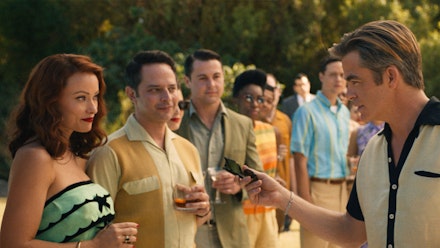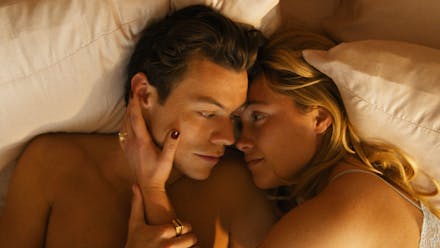Olivia Wilde’s directorial debut, Booksmart, is a delightful portrait of teenage life that constantly sidesteps your expectations to hilarious effect. This follow-up is vastly more ambitious and harder to instantly embrace. The good news is that it shows considerably more ambition and is anchored by an extraordinary performance from Florence Pugh.
We open in the apparently ideal community of Victory, a company oasis in a hostile desert where the men work each day and the women exist to support them. Alice (Pugh) and her husband Jack (Harry Styles) seem poised for great things, and spend their evenings partying with colleagues and friends. But after Alice’s friend Margaret (KiKi Layne, underserved) has a breakdown, and Alice starts to experience the same symptoms, it becomes clear that something is rotten underneath. Why did she see a plane crash that no-one else noticed? What does it mean? In the background looms Victory founder Frank (Chris Pine), the magnetic figurehead of the whole place, who seems to dare Alice to keep searching.

It’s an extraordinary piece of worldbuilding, with Wilde and cinematographer Matthew Libatique capturing the sun-soaked pastels of Mid-century Modern while managing to suggest something dark and dangerous underneath. There are obvious references, from Valley Of The Dolls to The Stepford Wives to the clean lines and bright colours of How To Marry A Millionaire. Pugh, all perfectly teased and tousled hair and big eyes, seems to belong right in the middle of this paradise — until she blows it all apart. Her performance, with suspicion rising and waning and her desperation growing, is flawless. Styles is solid in the less demanding role of her husband (the accent is deliberately British) but there’s no question that this is her film, and everyone else is just there for support.
This is a story bursting with big ideas, but not all are fully formed.
This is a story bursting with big ideas, from a critique of capitalism rhetoric and the nuclear family to issues relating to coercive control and even online radicalisation, but not all are fully formed. There are issues of children being used to rein women in, in a way that’s deeply uncomfortable, and questions of female complicity in the patriarchy that don’t quite coalesce.
In fact, there’s a lack of cohesion to the whole last act. The revelations that come feel less earth-shaking than they should. Perhaps because we’re desensitised to misogyny, so that what comes is simultaneously too familiar and too out there. But it may simply be that, after a slow-burning build-up that revels in detail and the gradually spreading cracks in Alice’s psyche, everything happens too fast to feel as personal or as immediate as what has gone before. We want a confrontation that Alice never quite gets, and a sense of closure that never arrives. That might be Wilde’s point — these are, after all, messy questions and nebulous forces that reach far beyond the individual — but there’s a nagging feeling at the end that something remains unspoken and unrealised.
